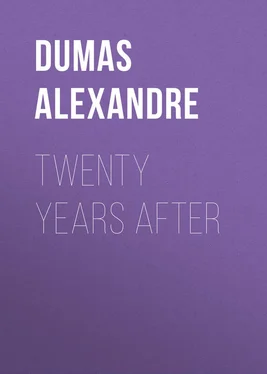Alexandre Dumas - Twenty Years After
Здесь есть возможность читать онлайн «Alexandre Dumas - Twenty Years After» — ознакомительный отрывок электронной книги совершенно бесплатно, а после прочтения отрывка купить полную версию. В некоторых случаях можно слушать аудио, скачать через торрент в формате fb2 и присутствует краткое содержание. Жанр: literature_19, foreign_antique, foreign_prose, на английском языке. Описание произведения, (предисловие) а так же отзывы посетителей доступны на портале библиотеки ЛибКат.
- Название:Twenty Years After
- Автор:
- Жанр:
- Год:неизвестен
- ISBN:нет данных
- Рейтинг книги:5 / 5. Голосов: 1
-
Избранное:Добавить в избранное
- Отзывы:
-
Ваша оценка:
- 100
- 1
- 2
- 3
- 4
- 5
Twenty Years After: краткое содержание, описание и аннотация
Предлагаем к чтению аннотацию, описание, краткое содержание или предисловие (зависит от того, что написал сам автор книги «Twenty Years After»). Если вы не нашли необходимую информацию о книге — напишите в комментариях, мы постараемся отыскать её.
Twenty Years After — читать онлайн ознакомительный отрывок
Ниже представлен текст книги, разбитый по страницам. Система сохранения места последней прочитанной страницы, позволяет с удобством читать онлайн бесплатно книгу «Twenty Years After», без необходимости каждый раз заново искать на чём Вы остановились. Поставьте закладку, и сможете в любой момент перейти на страницу, на которой закончили чтение.
Интервал:
Закладка:
“Why do you say that?” asked the queen, almost timidly.
“Why, it seems to me that the way in which he left us needs no explanation. Besides, his majesty takes no pains to conceal how little affection he has for me. That, however, does not hinder me from being entirely devoted to his service, as I am to that of your majesty.”
“I ask your pardon for him, cardinal,” said the queen; “he is a child, not yet able to understand his obligations to you.”
The cardinal smiled.
“But,” continued the queen, “you have doubtless come for some important purpose. What is it, then?”
Mazarin sank into a chair with the deepest melancholy painted on his countenance.
“It is likely,” he replied, “that we shall soon be obliged to separate, unless you love me well enough to follow me to Italy.”
“Why,” cried the queen; “how is that?”
“Because, as they say in the opera of ‘Thisbe,’ ‘The whole world conspires to break our bonds.’”
“You jest, sir!” answered the queen, endeavoring to assume something of her former dignity.
“Alas! I do not, madame,” rejoined Mazarin. “Mark well what I say. The whole world conspires to break our bonds. Now as you are one of the whole world, I mean to say that you also are deserting me.”
“Cardinal!”
“Heavens! did I not see you the other day smile on the Duke of Orleans? or rather at what he said?”
“And what was he saying?”
“He said this, madame: ‘Mazarin is a stumbling-block. Send him away and all will then be well.’”
“What do you wish me to do?”
“Oh, madame! you are the queen!”
“Queen, forsooth! when I am at the mercy of every scribbler in the Palais Royal who covers waste paper with nonsense, or of every country squire in the kingdom.”
“Nevertheless, you have still the power of banishing from your presence those whom you do not like!”
“That is to say, whom you do not like,” returned the queen.
“I! persons whom I do not like!”
“Yes, indeed. Who sent away Madame de Chevreuse after she had been persecuted twelve years under the last reign?”
“A woman of intrigue, who wanted to keep up against me the spirit of cabal she had raised against M. de Richelieu.”
“Who dismissed Madame de Hautefort, that friend so loyal that she refused the favor of the king that she might remain in mine?”
“A prude, who told you every night, as she undressed you, that it was a sin to love a priest, just as if one were a priest because one happens to be a cardinal.”
“Who ordered Monsieur de Beaufort to be arrested?”
“An incendiary the burden of whose song was his intention to assassinate me.”
“You see, cardinal,” replied the queen, “that your enemies are mine.”
“That is not enough madame, it is necessary that your friends should be also mine.”
“My friends, monsieur?” The queen shook her head. “Alas, I have them no longer!”
“How is it that you have no friends in your prosperity when you had many in adversity?”
“It is because in my prosperity I forgot those old friends, monsieur; because I have acted like Queen Marie de Medicis, who, returning from her first exile, treated with contempt all those who had suffered for her and, being proscribed a second time, died at Cologne abandoned by every one, even by her own son.”
“Well, let us see,” said Mazarin; “isn’t there still time to repair the evil? Search among your friends, your oldest friends.”
“What do you mean, monsieur?”
“Nothing else than I say-search.”
“Alas, I look around me in vain! I have no influence with any one. Monsieur is, as usual, led by his favorite; yesterday it was Choisy, to-day it is La Riviere, to-morrow it will be some one else. Monsieur le Prince is led by the coadjutor, who is led by Madame de Guemenee.”
“Therefore, madame, I ask you to look, not among your friends of to-day, but among those of other times.”
“Among my friends of other times?” said the queen.
“Yes, among your friends of other times; among those who aided you to contend against the Duc de Richelieu and even to conquer him.”
“What is he aiming at?” murmured the queen, looking uneasily at the cardinal.
“Yes,” continued his eminence; “under certain circumstances, with that strong and shrewd mind your majesty possesses, aided by your friends, you were able to repel the attacks of that adversary.”
“I!” said the queen. “I suffered, that is all.”
“Yes,” said Mazarin, “as women suffer in avenging themselves. Come, let us come to the point. Do you know Monsieur de Rochefort?”
“One of my bitterest enemies-the faithful friend of Cardinal Richelieu.”
“I know that, and we sent him to the Bastile,” said Mazarin.
“Is he at liberty?” asked the queen.
“No; still there, but I only speak of him in order that I may introduce the name of another man. Do you know Monsieur d’Artagnan?” he added, looking steadfastly at the queen.
Anne of Austria received the blow with a beating heart.
“Has the Gascon been indiscreet?” she murmured to herself, then said aloud:
“D’Artagnan! stop an instant, the name seems certainly familiar. D’Artagnan! there was a musketeer who was in love with one of my women. Poor young creature! she was poisoned on my account.”
“That’s all you know of him?” asked Mazarin.
The queen looked at him, surprised.
“You seem, sir,” she remarked, “to be making me undergo a course of cross-examination.”
“Which you answer according to your fancy,” replied Mazarin.
“Tell me your wishes and I will comply with them.”
The queen spoke with some impatience.
“Well, madame,” said Mazarin, bowing, “I desire that you give me a share in your friends, as I have shared with you the little industry and talent that Heaven has given me. The circumstances are grave and it will be necessary to act promptly.”
“Still!” said the queen. “I thought that we were finally quit of Monsieur de Beaufort.”
“Yes, you saw only the torrent that threatened to overturn everything and you gave no attention to the still water. There is, however, a proverb current in France relating to water which is quiet.”
“Continue,” said the queen.
“Well, then, madame, not a day passes in which I do not suffer affronts from your princes and your lordly servants, all of them automata who do not perceive that I wind up the spring that makes them move, nor do they see that beneath my quiet demeanor lies the still scorn of an injured, irritated man, who has sworn to himself to master them one of these days. We have arrested Monsieur de Beaufort, but he is the least dangerous among them. There is the Prince de Conde-”
“The hero of Rocroy. Do you think of him?”
“Yes, madame, often and often, but pazienza, as we say in Italy; next, after Monsieur de Conde, comes the Duke of Orleans.”
“What are you saying? The first prince of the blood, the king’s uncle!”
“No! not the first prince of the blood, not the king’s uncle, but the base conspirator, the soul of every cabal, who pretends to lead the brave people who are weak enough to believe in the honor of a prince of the blood-not the prince nearest to the throne, not the king’s uncle, I repeat, but the murderer of Chalais, of Montmorency and of Cinq-Mars, who is playing now the same game he played long ago and who thinks that he will win the game because he has a new adversary-instead of a man who threatened, a man who smiles. But he is mistaken; I shall not leave so near the queen that source of discord with which the deceased cardinal so often caused the anger of the king to rage above the boiling point.”
Читать дальшеИнтервал:
Закладка:
Похожие книги на «Twenty Years After»
Представляем Вашему вниманию похожие книги на «Twenty Years After» списком для выбора. Мы отобрали схожую по названию и смыслу литературу в надежде предоставить читателям больше вариантов отыскать новые, интересные, ещё непрочитанные произведения.
Обсуждение, отзывы о книге «Twenty Years After» и просто собственные мнения читателей. Оставьте ваши комментарии, напишите, что Вы думаете о произведении, его смысле или главных героях. Укажите что конкретно понравилось, а что нет, и почему Вы так считаете.


![О Генри - Через двадцать лет [After Twenty Years]](/books/415401/o-genri-cherez-dvadcat-let-after-twenty-years-thumb.webp)









